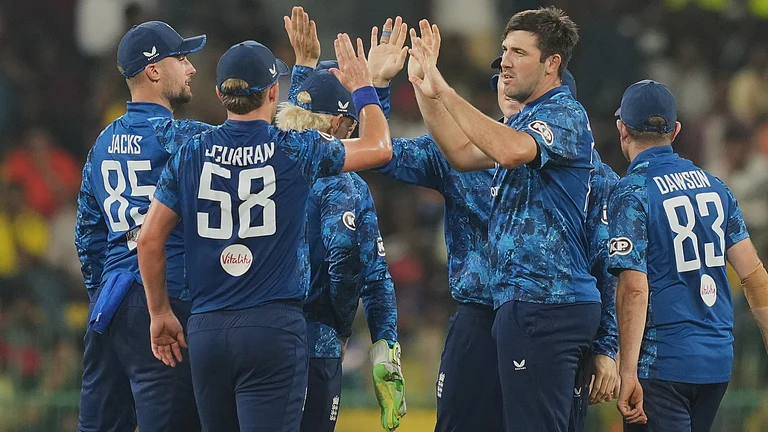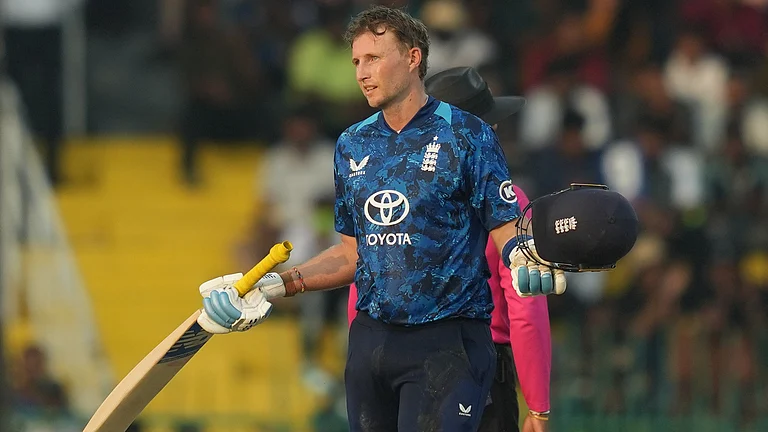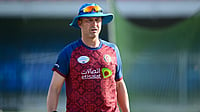Forty five years after becoming the first Black cricketer to play for England, Roland Butcher says there is still a long way to go before racism is rooted out of the game and the British society in general.
Butcher, who shuttles between his native Barbados and the United Kingdom, is currently in England spreading the message of an inclusive society through his autobiography -– 'Breaking Barriers: Barbados to England and Back'.
Speaking to PTI, the 71-year-old, who made history by playing three Tests and as many ODIs for England, looked back at his early days as a black cricketer in the '70s and '80s, his last minute withdrawal from the rebel tour of South Africa in the apartheid era and how his story opened the doors for the younger generations who went on to play for the country.
"I am pragmatic enough to understand that something doesn't just finish just like that. The only thing that would finish anything in a hurry is a meteorite. But everything takes time and you chip away at it," said Butcher, a former batter.
"Racism has been chipped away in England by a foreign person since the 1950s. We're in 2025 and we're still talking about it. So that tells you just how long the process is.
"I think it's a never-ending process. It's one that has to be worked at all the time. So, you know, you've got to keep chipping away. We've got it to this point, but there's still a long way to go." Butcher was among the many in the cricketing world that were shocked by racism allegations made by Karachi-born cricketer Azeem Rafiq against his county team Yorkshire in 2020, leading to multiple resignations at the club.
Though it is easier to call out racism in county cricket than his playing days, Butcher feels the discrimination, whether subtle or in your face, remains.
"There has been incremental progress. I don't think that you will just suddenly get a blank sheet of paper and it'll all be a perfect drawing on it. That's not going to happen. I think it's something that has to be worked at continuously. And gradually over time, let's reduce the instances.
"But it's not going to just suddenly disappear. If something's been going on for centuries, it doesn't disappear within one year. And both players, ECB, everybody has to work at it. Trying to just level the playing field. That's the important thing," said Butcher.
Lot of black players had it more difficult than me
Butcher played for Middlesex from 1974 to 1990. He faced racism on the county cricket circuit but the others had it much tougher.
"Well, for me personally, it wasn't that bad because (as he grew up in Barbados before moving to England at the age of 13), I am the sort of person that I didn't let anything deter me from what I really wanted to achieve. But in saying that, back in the '80s, there certainly was a lot of racism in England, not just in cricket, but I think in society.
"A lot of black players had difficult times, more difficult times than me around the circuit. But having made the breakthrough, I think it assisted a number of other black players who had been striving to get forward.
"I'm still very proud of that achievement because as I said, not only did I get to where I wanted to be as an international cricketer and achieve what I wanted to, I'm very proud that it opened the doors for many and many black players have passed through that door as well."
'They have got five black cricketers playing for them’
Having said that, incidents of casual racism remember remains fresh in Butcher’s memory.
“One of the things that I remember me personally is, I was fortunate to play in a very good Middlesex team that was very successful. We had a lot of good players, but we also had, at any one time, we had five black players in the team. So there was myself, Wayne Daniel, Will Slack, Neil Williams and Norman Collins.
"So, you know, we were a pretty multi-racial team, but it didn't stop opposition fans from remarking at times. I can remember one particular game against Kent where we were taking the field after tea and as we walked through the crowd, someone remarked, 'look, they've got five of them'.
"I just thought, how perceptive, we've been playing all day and you only just realised that there's five black players in Middlesex team," he recollected as if it was yesterday.
Withdrawal from rebel tour of South Africa
Butcher was a beacon of hope for the Black community in England but a controversy erupted when he decided to tour South Africa in 1989 when the apartheid policy was still in effect and the team from the rainbow nation was banned from international cricket.
There was intense backlash and Butcher realised that it was in his and his community's best interests that he did not board the flight to South Africa with a predominantly white team, including captain Mike Gatting.
"I had made the decision to go for various reasons. And, then in reflection over a period of time, perhaps a little bit more education, I realised that going would be perhaps not the best thing in my interest or in the interest of black people in South Africa and outside of South Africa.
"There were legal challenges but then I made the decision to withdraw from the tour," said Butcher, who played county cricketer against the likes of Farok Engineer, Sunil Gavaskar, Bishan Singh Bedi and Imran Khan.
Britain has no choice but to be more tolerant
In the end, Butcher said it is not all doom and gloom when it comes to dealing with racial matters in England, considering a sizeable chunk of the country's population is black or coloured.
"I think Britain is a much more tolerant country now than it used to be. It has to be if you think of the nationalities that live within England, Scotland and Wales right now. They have no choice but to be more tolerant because there are large percentages of foreign people living in this land.
"...Back in the '70s, '80s, '90s, it would have been much more difficult to call out racism because any black or Asian or any foreign player didn't feel they could speak out because they were not represented in any way.
"Now they've got more of a voice because they're now encouraged to speak out. If you have a problem within your club, you're now encouraged to speak. And they've got people dedicated within the clubs to listen to you and take it forward. That didn't happen before. So again, that is progress," concluded Butcher.


























